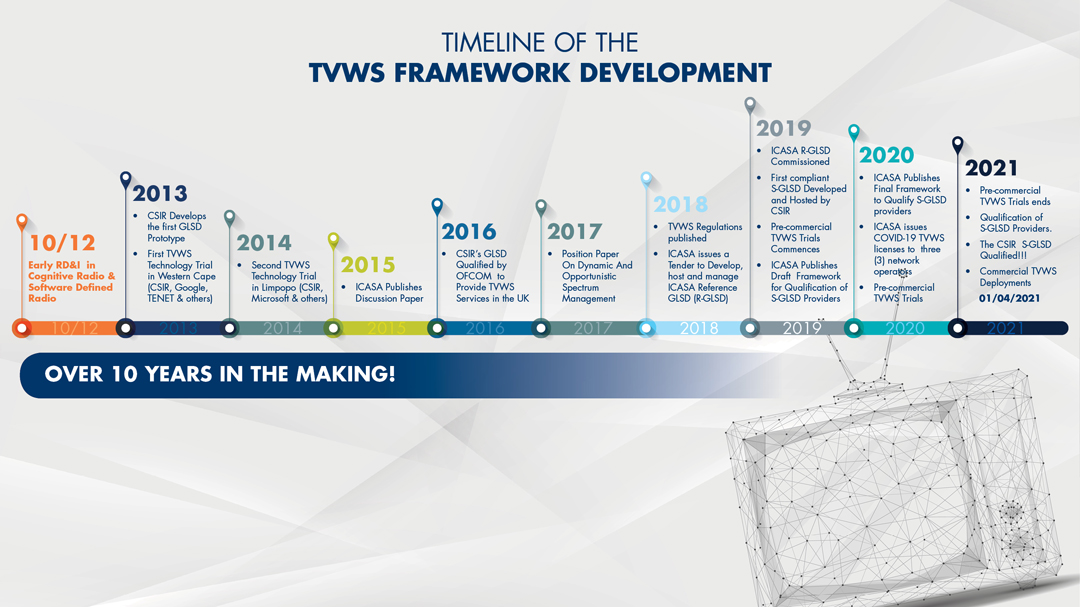Over a decade of hard work has finally paid off as the CSIR completed qualification of its Secondary Geo-Location Spectrum Database (S-GLSD), and can now commercially provide services to network operators in South Africa.
The qualification carried out by the Independent Communications Authority of South Africa (ICASA) ushers a new era of spectrum sharing networks to accelerate the digital transformation of African countries. “The qualification of the S-GLSD also marks an important milestone in the development of the CSIR Spectrum innovation technology eco-system which is comprised of other innovative tools including the Reference Geo-Location Spectrum Database (R-GLSD), wireless network planning tool and wireless network infrastructure sharing tool,” says Dr Luzango Mfupe, CSIR Principal Researcher.
The S-GLSD is a spectrum management tool that enables efficient allocation of usable spectrum, and enables internet service providers to deploy spectrum sharing broadband networks to underserved communities using the Television white space (TVWS) technology. “Through the S-GLSD enabled TVWS technology, the rural and township based small, medium and micro enterprises (SMMEs) network operators will now get support to deploy affordable broadband internet services in compliance with the ICASA TVWS regulatory framework. This will improve the business models of the SMMEs for sustainability and creation of innovative services, which is one of the projects the CSIR is executing in collaboration with the United Nations Development Programme (UNDP),” says Fisseha Mekuria, CSIR Chief Researcher.
Providing connectivity during COVID-19 pandemic
In 2020 at the peak of the Covid-19 pandemic, the CSIR partnered with the Technology Innovation Agency (TIA) and ICASA, to enable local internet service providers to deploy affordable TVWS broadband networks, enabled by the CSIR’s S-GLSD platform.
This was in line with ICASA’s request for the CSIR to invite interested TVWS network operators approved by ICASA to use its S-GLSD services free of charge in an effort to improve the national broadband internet capacity and provide relevant and up-to-date information to the public in the fight against the Covid-19 pandemic.
The TIA which provided partial funding for the industrialisation of the CSIR spectrum innovation technologies, agreed to make the GLSD technologies freely available to SMMEs interested in providing broadband internet services by deploying TVWS networks. “These kinds of technologies are crucial to ensure that no one is left behind, especially during this Covid-19 pandemic,” said TIA Head of ICT, Mr. Rudzani Mulaudzi at the time.
This intervention played a big role in supporting the provision of life-saving information and enabling online learning for populations in previously disadvantaged and rural communities during the Covid-19 pandemic.
Connecting rural areas
Recently the CSIR partnered with the UNDP in a two-phase project to support digital entrepreneurs in rolling out affordable broadband networks in rural South Africa. “The main objective of the project is to implement wireless network infrastructures for providing affordable broadband internet connectivity in the mostly needy communities around the country,” says Dr. Luzango Mfupe, CSIR Principal Researcher.
The project is currently being launched in four provinces Eastern Cape, KwaZulu Natal, Free State and the Western Cape. Phase 2 of the project will see 10 more SMMEs being funded by the project to install low-cost internet in their respective communities. The Foreign, Commonwealth and Development Office (FCDO) of the United Kingdome (UK) government has come on board to support this initiative through a partnership project with CSIR that will focus on the long-term sustainability of the beneficiary SMMEs by providing them with business and technical capacity building, ongoing technical support as well as monitoring and evaluation support.
An award-winning technology
In 2020 the CSIR Smart Spectrum Sharing team clinched the 2019/2020 National Science and Technology Forum (NSTF) award in the category Innovation excellence in Corporate Organisation. The NSTF Awards is a flagship project of the NSTF, in partnership with mining and metals company South32.
The award was in recognition of the team’s international certification and demonstrated innovation excellence in research and development of smart spectrum sharing technologies.
“It was a fitting tribute for the CSIR team to receive the Science Oscars NSTF-2020 award, as 2020 was the year CSIR celebrated its 75 Years of inception as a leading research and innovation organisation in Science and technology,” says Mekuria.
The future
As the world is moving towards a more connected and digital savvy society, wireless technologies of the future require intelligent spectrum sharing and management techniques. The continued CSIR research, development and innovation (R&DI) investment in the design of smart spectrum innovation systems is aimed at addressing these future wireless system requirements. The CSIR smart spectrum innovation technologies are expected to enable more flexible wireless internet services involving technologies such as IoT, AI and machine learning, and will also play a key role of connecting underserved rural and township communities for digital inclusion in South Africa and globally.

Contact Person: Dr Luzango Mfupe, @email,